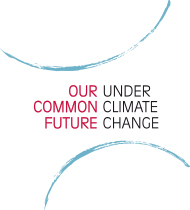�
Our Common Future Under Climate Change
International Scientific Conference 7-10 JULY 2015 Paris, France
Abbie Trayler-Smith / Panos Pictures / Department for International Development
Why gender matters for climate change
201507-02
By Dr Virginie Le Masson
Virginie Le Masson will be presenting at CFCC15 session Gender and climate change: From vulnerability to mainstreaming in adaptation and mitigation on Day 3.
What does gender have to do with climate change? It�s a question I often hear when engaging with practitioners and policy-makers. I am a researcher who advocates for attention to gender to be integrated in efforts to address climate change -- in climate change mitigation, in strategies to adapt to climate impacts, and in negotiations towards a global climate change agreement.�
To answer that question, I tend to avoid using the mainstream argument that women are more vulnerable to climate change than men. �By now, many studies have documented that women are part of households and relationships from which they cannot necessarily be separated (Dankelman, 2010). Whatever impacts women will also impact those around them, albeit in different ways. This is why we must work on gender relations rather than on women only (Tacoli et al., 2014).
Instead, I show that men and women across societies have different roles and perspectives, which make their relation with their environment very different. While conducting research in the Himalayan province of Ladakh (India), I realised for instance that when asking local villagers questions around water access, I received very different answers from women than those that my male research colleague received from men he interviewed. People in Ladakh rely on glacier and snow melted water for daily consumption and irrigation. But changes in temperatures, combined with increased demand for limited water resources, make water availability fluctuate dramatically.�
While men did not raise any concerns to access water, almost all women I interviewed said that water access was one of their main daily challenges. This is because women are responsible for fetching water and for irrigating fields and therefore they have a first-hand knowledge of the availability of water and how climate change is impacting this resource.
There are countless other examples showing that attention to gender differences matters when working on adaptation to climate change. But this is also true for climate change mitigation. The European Institute for Gender Equality reports that women and men living in Europe contribute differently to greenhouse gases (GHG).�
For instance, their 2012 study shows that more women use public transport but that men tend to be more conscious about purchasing energy-efficient cars. Women also more often declare themselves willing to choose low carbon practices and make changes in their everyday lifestyles like choosing cleaner power supply.
Attention to gender and gender relations does help us understand how differences of access to resources and power between men and women influence how populations interact and care for their environment. Gender constructions, i.e. social norms, traditions and cultural aspects of the societies we grow up in, influence who we are, how we interact with each other and what roles we are supposed or able to play in our societies.�
And I do believe that only when we seriously listen to and integrate the perspectives of those we rarely hear from, can we reconcile development progress and the imperative to care for the environment.
Beyond the question of gender differences, is the issue of gender equality and access to power. Tackling gender inequalities is necessary to achieve sustainable development (not to mention to respect basic human rights), and vice versa.�
Only when we recognise difference but challenge inequalities can we ensure that those who suffer from discriminatory laws or unfair economic practices will not further suffer from the adverse impacts of climate change. Only when we confront gender imbalances, can we create an enabling environment for those traditionally excluded from power positions, to participate equally in making decisions and creating policies that will affect their lives positively.
Dr Virginie Le Masson is a Research Officer working for the Social Development and Climate and Environment programmes at the Overseas Development Institute, London. Virginie is also the Gender focal point for the Climate and Development Knowledge Network (CDKN). Her research focuses on the gender dimension of disaster risk reduction and climate change mitigation and adaptation. She is co-editing a book on gender and climate change for Routledge, to be published in March 2016.
This is part of a blog series profiling climate scientists, economists, social scientists and civil society members who are presenting and discussing innovative climate science at Our Common Future. For more follow and #CFCC15 on Twitter.







